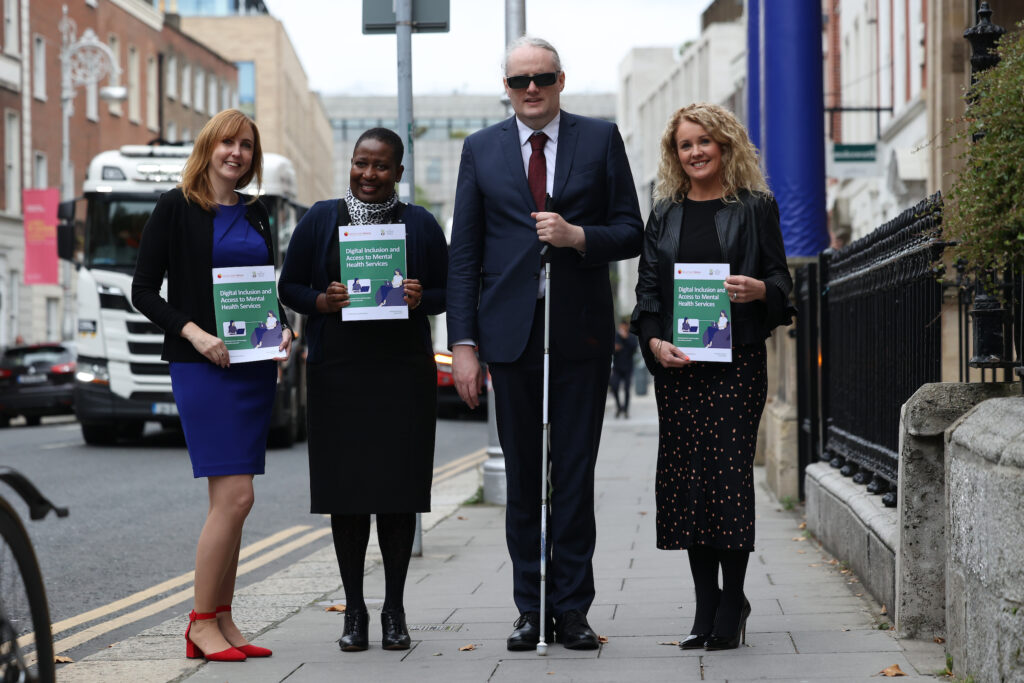
Mental Health Reform and HSE Mental Health Engagement and Recovery office recently unveiled our ground-breaking report on “Digital Inclusion and Access to Mental Health Services.”
Digital inclusion refers to the activities necessary to ensure that all individuals and communities, including the most disadvantaged, have access to and use of Information and Communication Technologies. With an increased number of mental health services and supports becoming available in digital form, ensuring these services are available and accessible to all those who need them has become more vital than ever.
The report seeks to cast light on the issue of digital inequalities experienced by those with mental health difficulties and its impact on mental health and wellbeing.
The use of digital mental health technologies brings numerous benefits, including increased flexibility and the potential for innovative service delivery. However, certain population groups may face disadvantages in this post-pandemic ‘new normal’ if their needs are not addressed.

Illustrative listing of opportunities presented by digital mental health
Specific group | Opportunity area that could be leveraged to improve access to mental health services |
Migrants and refugees | · Nationwide access to culturally competent practitioners/services, range of languages. · In-reach opportunities to provide more specialist services (e.g., trauma therapy). · Reduce barriers to accessing local mental health services because of transport issues. |
Travelling Community | · Nationwide access to Traveller-specific and culturally appropriate mental health services. · Anonymity and self-directed nature may reduce concerns around discrimination. · 24/7 or ‘out of hours’ aspect of online/digital options may be helpful for those in crisis. |
Prisoners | · Potential to open up access to community-based services available to general pop. · Support continuity of care before/during/after prison. · Dedicated mental health and substance abuse support services for people on probation. |
Blind / vision impaired | · Avoid challenges they may experience with transportation and navigation. · Access to mental health services specifically targeting people with vision impairments. · Accessible design and assistive technologies to make MH supports more available. |
Deaf / hard of hearing | · Videoconferencing a familiar mode of communication amongst Deaf community · Text-based supports/resources may be accessible for range of hearing abilities. · Potential for accessible design and assistive technologies to alleviate barriers. |
Homeless | · New opportunities for mental health services to reach this underserved population. · Digital tools for screening of prevalent mental health difficulties. · Specialist in-reach to support frontline MH services (e.g., through telepsychiatry). |
Older people | · Logistical benefits for older people in rural areas and/or who have reduced mobility. · Video consultation from home to address substantial unmet need amongst older people. · Enables increased access to specialist supports (psychiatry of later life, dementia, etc.). |
Younger people | · Generation of ‘digital natives’ – online/digital channels familiar mode of communication. · Reach young people where they are at; build rapport/trust with disengaged youth. · Facilitate access for young people/families not typically attending in person services. |
People with ongoing / enduring mental health difficulties | · Remote consultations may enable improved continuity of care. · Greater involvement in own care, empowerment, self-management. · Facilitate access to peer support through online support groups and other forums. |
Recommendations from the report
- Department of Health, HSE and mental health policy implementation processes to give digital mental health inclusion high visibility and importance in current and forthcoming strategies.
- Department of Health to engage with other Departments and Agencies on measures to address access to and affordability of digital mental health as an important category of online/digital public services.
- Mental Health Sector, within its own remit and scope of action, to develop approaches to address digital divide barriers for relevant mental health service users and usage contexts.
- Mental Health Sector to develop a line of action within a social-inclusion/inclusion-health framework to leverage digital mental health to reach and support vulnerable groups.
- Mental Health Sector to directly engage with mental health service users on their experience of digital mental health inclusion and involve them in developing solutions and service co-design.
- Mental Health Sector and Adult Literacy Sector to work together to develop and implement a large-scale programme combining digital skills and mental health literacy.
- Government to provide funding for ‘bottom-up’ digital mental health inclusion and innovation projects under Digital for Good or other relevant frameworks or funding mechanisms.
- Mental Health Sector to give focused attention to accessibility of online/digital mental health for people with disabilities.

